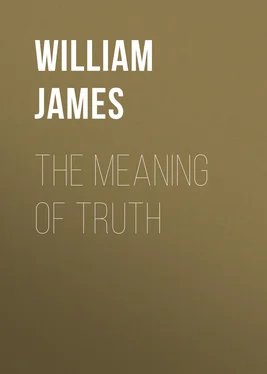William James - The Meaning of Truth
Здесь есть возможность читать онлайн «William James - The Meaning of Truth» — ознакомительный отрывок электронной книги совершенно бесплатно, а после прочтения отрывка купить полную версию. В некоторых случаях можно слушать аудио, скачать через торрент в формате fb2 и присутствует краткое содержание. Жанр: foreign_antique, Философия, foreign_edu, на английском языке. Описание произведения, (предисловие) а так же отзывы посетителей доступны на портале библиотеки ЛибКат.
- Название:The Meaning of Truth
- Автор:
- Жанр:
- Год:неизвестен
- ISBN:нет данных
- Рейтинг книги:3 / 5. Голосов: 1
-
Избранное:Добавить в избранное
- Отзывы:
-
Ваша оценка:
- 60
- 1
- 2
- 3
- 4
- 5
The Meaning of Truth: краткое содержание, описание и аннотация
Предлагаем к чтению аннотацию, описание, краткое содержание или предисловие (зависит от того, что написал сам автор книги «The Meaning of Truth»). Если вы не нашли необходимую информацию о книге — напишите в комментариях, мы постараемся отыскать её.
The Meaning of Truth — читать онлайн ознакомительный отрывок
Ниже представлен текст книги, разбитый по страницам. Система сохранения места последней прочитанной страницы, позволяет с удобством читать онлайн бесплатно книгу «The Meaning of Truth», без необходимости каждый раз заново искать на чём Вы остановились. Поставьте закладку, и сможете в любой момент перейти на страницу, на которой закончили чтение.
Интервал:
Закладка:
To what effect? That we may the better foresee the course of our experiences, communicate with one another, and steer our lives by rule. Also that we may have a cleaner, clearer, more inclusive mental view.
The greatest common-sense achievement, after the discovery of one Time and one Space, is probably the concept of permanently existing things. When a rattle first drops out of the hand of a baby, he does not look to see where it has gone. Non-perception he accepts as annihilation until he finds a better belief. That our perceptions mean BEINGS, rattles that are there whether we hold them in our hands or not, becomes an interpretation so luminous of what happens to us that, once employed, it never gets forgotten. It applies with equal felicity to things and persons, to the objective and to the ejective realm. However a Berkeley, a Mill, or a Cornelius may CRITICISE it, it WORKS; and in practical life we never think of 'going back' upon it, or reading our incoming experiences in any other terms. We may, indeed, speculatively imagine a state of 'pure' experience before the hypothesis of permanent objects behind its flux had been framed; and we can play with the idea that some primeval genius might have struck into a different hypothesis. But we cannot positively imagine today what the different hypothesis could have been, for the category of trans-perceptual reality is now one of the foundations of our life. Our thoughts must still employ it if they are to possess reasonableness and truth.
This notion of a FIRST in the shape of a most chaotic pure experience which sets us questions, of a SECOND in the way of fundamental categories, long ago wrought into the structure of our consciousness and practically irreversible, which define the general frame within which answers must fall, and of a THIRD which gives the detail of the answers in the shapes most congruous with all our present needs, is, as I take it, the essence of the humanistic conception. It represents experience in its pristine purity to be now so enveloped in predicates historically worked out that we can think of it as little more than an OTHER, of a THAT, which the mind, in Mr. Bradley's phrase, 'encounters,' and to whose stimulating presence we respond by ways of thinking which we call 'true' in proportion as they facilitate our mental or physical activities and bring us outer power and inner peace. But whether the Other, the universal THAT, has itself any definite inner structure, or whether, if it have any, the structure resembles any of our predicated WHATS, this is a question which humanism leaves untouched. For us, at any rate, it insists, reality is an accumulation of our own intellectual inventions, and the struggle for 'truth' in our progressive dealings with it is always a struggle to work in new nouns and adjectives while altering as little as possible the old.
It is hard to see why either Mr. Bradley's own logic or his metaphysics should oblige him to quarrel with this conception. He might consistently adopt it verbatim et literatim, if he would, and simply throw his peculiar absolute round it, following in this the good example of Professor Royce. Bergson in France, and his disciples, Wilbois the physicist and Leroy, are thoroughgoing humanists in the sense defined. Professor Milhaud also appears to be one; and the great Poincare misses it by only the breadth of a hair. In Germany the name of Simmel offers itself as that of a humanist of the most radical sort. Mach and his school, and Hertz and Ostwald must be classed as humanists. The view is in the atmosphere and must be patiently discussed.
The best way to discuss it would be to see what the alternative might be. What is it indeed? Its critics make no explicit statement, Professor Royce being the only one so far who has formulated anything definite. The first service of humanism to philosophy accordingly seems to be that it will probably oblige those who dislike it to search their own hearts and heads. It will force analysis to the front and make it the order of the day. At present the lazy tradition that truth is adaequatio intellectus et rei seems all there is to contradict it with. Mr. Bradley's only suggestion is that true thought 'must correspond to a determinate being which it cannot be said to make,' and obviously that sheds no new light. What is the meaning of the word to 'correspond'? Where is the 'being'? What sort of things are 'determinations,' and what is meant in this particular case by 'not to make'?
Humanism proceeds immediately to refine upon the looseness of these epithets. We correspond in SOME way with anything with which we enter into any relations at all. If it be a thing, we may produce an exact copy of it, or we may simply feel it as an existent in a certain place. If it be a demand, we may obey it without knowing anything more about it than its push. If it be a proposition, we may agree by not contradicting it, by letting it pass. If it be a relation between things, we may act on the first thing so as to bring ourselves out where the second will be. If it be something inaccessible, we may substitute a hypothetical object for it, which, having the same consequences, will cipher out for us real results. In a general way we may simply ADD OUR THOUGHT TO IT; and if it SUFFERS THE ADDITION, and the whole situation harmoniously prolongs and enriches itself, the thought will pass for true.
As for the whereabouts of the beings thus corresponded to, although they may be outside of the present thought as well as in it, humanism sees no ground for saying they are outside of finite experience itself. Pragmatically, their reality means that we submit to them, take account of them, whether we like to or not, but this we must perpetually do with experiences other than our own. The whole system of what the present experience must correspond to 'adequately' may be continuous with the present experience itself. Reality, so taken as experience other than the present, might be either the legacy of past experience or the content of experience to come. Its determinations for US are in any case the adjectives which our acts of judging fit to it, and those are essentially humanistic things.
To say that our thought does not 'make' this reality means pragmatically that if our own particular thought were annihilated the reality would still be there in some shape, though possibly it might be a shape that would lack something that our thought supplies. That reality is 'independent' means that there is something in every experience that escapes our arbitrary control. If it be a sensible experience it coerces our attention; if a sequence, we cannot invert it; if we compare two terms we can come to only one result. There is a push, an urgency, within our very experience, against which we are on the whole powerless, and which drives us in a direction that is the destiny of our belief. That this drift of experience itself is in the last resort due to something independent of all possible experience may or may not be true. There may or may not be an extra-experiential 'ding an sich' that keeps the ball rolling, or an 'absolute' that lies eternally behind all the successive determinations which human thought has made. But within our experience ITSELF, at any rate, humanism says, some determinations show themselves as being independent of others; some questions, if we ever ask them, can only be answered in one way; some beings, if we ever suppose them, must be supposed to have existed previously to the supposing; some relations, if they exist ever, must exist as long as their terms exist.
Конец ознакомительного фрагмента.
Текст предоставлен ООО «ЛитРес».
Прочитайте эту книгу целиком, купив полную легальную версию на ЛитРес.
Читать дальшеИнтервал:
Закладка:
Похожие книги на «The Meaning of Truth»
Представляем Вашему вниманию похожие книги на «The Meaning of Truth» списком для выбора. Мы отобрали схожую по названию и смыслу литературу в надежде предоставить читателям больше вариантов отыскать новые, интересные, ещё непрочитанные произведения.
Обсуждение, отзывы о книге «The Meaning of Truth» и просто собственные мнения читателей. Оставьте ваши комментарии, напишите, что Вы думаете о произведении, его смысле или главных героях. Укажите что конкретно понравилось, а что нет, и почему Вы так считаете.












